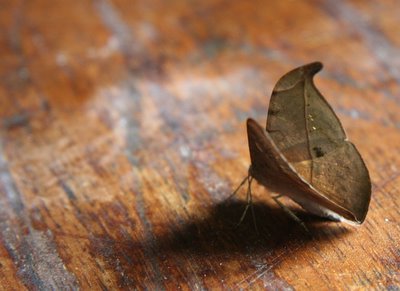 In English, we say "You can't judge a book by its cover."
In English, we say "You can't judge a book by its cover."For example, these aren't leaves in these photos -- I've had to remind myself that they're moths almost every time I've come across them. And the chickens in the school's yard aren't ours -- they belong to a family up the hill (quite far, I'd say, as the chicken flies) -- but the horse that sometimes meanders into the classroom doorways does, in fact, belong somehow to the school.
 Oh, and the innocent faces of kids celebrating Carnaval can actually be quite demonic -- at least when they have a globo de agua behind their back and can't wait to unleash their prized water balloon on unsuspecting passers-by. And the sweet little powerhouse of a water-warmer (an electric device that gives us delightfully warm showers) can turn sadistic without warning: as evidence, I offer my by-turns-scalding-and-freezing shower yesterday.
Oh, and the innocent faces of kids celebrating Carnaval can actually be quite demonic -- at least when they have a globo de agua behind their back and can't wait to unleash their prized water balloon on unsuspecting passers-by. And the sweet little powerhouse of a water-warmer (an electric device that gives us delightfully warm showers) can turn sadistic without warning: as evidence, I offer my by-turns-scalding-and-freezing shower yesterday.But the Spanish version of the same proverb is "Caras vemos, corazones no sabemos." And that has rung very true this week: "Faces we see, hearts we don't know."
The student I'll call F is as animated as he is talented -- playing a handful of different instruments during Mass and offering salutations to me in English, Spanish and German. But get past the first round or two of polite greetings -- get to the one where you can really ask someone how they are, and you find out that he hasn't eaten in three days.
 There is a solution here -- and it's a good one. I think it's been in place since the start of the university 13 academic years ago. It's the student-run meal cooperatives, where students pool their money to buy food they hire local women to prepare. The students organize the whole thing (with the able help of Maria, one of us volunteer folks) -- from buying the food in the next village over, to posting charts about whose turn it is to clean up, to making the heart-wrenching decisions about who can fill the few available spots. (There's also what to do with debtors, and, on a lighter note, how much to charge us volunteers who want to pay to share a meal with the students as a happy ongoing donation.)
There is a solution here -- and it's a good one. I think it's been in place since the start of the university 13 academic years ago. It's the student-run meal cooperatives, where students pool their money to buy food they hire local women to prepare. The students organize the whole thing (with the able help of Maria, one of us volunteer folks) -- from buying the food in the next village over, to posting charts about whose turn it is to clean up, to making the heart-wrenching decisions about who can fill the few available spots. (There's also what to do with debtors, and, on a lighter note, how much to charge us volunteers who want to pay to share a meal with the students as a happy ongoing donation.) The cooperative effort is significantly underwritten by the university, thanks to the generosity of donors to the Carmen Pampa Fund in Minnesota. But because demand is so high and resources are so low, the students directing the cooperatives have to make and then enforce what can feel like arbitrary rules: only one sibling per family can join, for example, and then only students who live on campus. Meaning that students who arrive late (because the buses or boats didn't run on schedule, or because the family member they depended on for transport or fare wasn't so dependable) not only don't get a spot in the dorms, they don't get food. That's the situation with F.
The situation with E is different -- she got in, but that meant her little brother didn't. So she pleaded with the mesa directiva to give her spot to him instead. Which at first seems like what any of us would do for our little siblings, especially if we had been responsible for them for the better part of our lives. But I'll admit I would give it hypothetical second-thoughts if it meant I didn't have food -- for an entire semester worth of classes and homework and even work in the fields.
 So F got a big chunk of leftover pork, roasted potatoes, and plantains. And he was smiling big. But 'faces we see, hearts we don't know' -- even as carefully as he'll no doubt mete that food out over the next days, he'll be hungry again. Maybe even before Mass in another hour.
So F got a big chunk of leftover pork, roasted potatoes, and plantains. And he was smiling big. But 'faces we see, hearts we don't know' -- even as carefully as he'll no doubt mete that food out over the next days, he'll be hungry again. Maybe even before Mass in another hour.And E got a gig washing clothes in our house -- I paid her twice the going rate and fed her lunch to boot. She'll come back every week, and I hope eventually she'll be well-enough-fed that I won't be able to see the difference in her energy level half way through our shared meal. It may sound melodramatic, but it was like she was coming back to life a little bit more with every bite.
So I ask myself -- how many times do I have to learn this same lesson? How many times do we as a planet have to be exposed to the same hard-to-hear stories? We produce 10% more food worldwide than it would take to feed everybody adequately. 25% of the prepared food in the US gets thrown out uneaten. We know how to end hunger -- this is well-established and was taught to me during my stint as a Mickey Leland Hunger Fellow with the Congressional Hunger Center back in 96-97. All that's missing is the political will.
 They just rang the bell again for Mass. My belly isn't empty, so I won't have trouble following the readings and the re-enactment of Jesus' teaching how he's undoing all the violence in the world.
They just rang the bell again for Mass. My belly isn't empty, so I won't have trouble following the readings and the re-enactment of Jesus' teaching how he's undoing all the violence in the world. I pray that I'll understand. And that we'll make the change -- Gandhi would say we must be the change. Soon.
PS: Because you good folks reading this have asked, the Carmen Pampa Fund has several different ways to sponsor students here at the UAC -- from covering their food (only $30 a month, I think -- but let me check on that) to paying their tuition. It's remarkable how much can be accomplished with just a small amount of money. The administration and the Fund both work hard to make it so -- and the students do their fair share too. You can read more about it on their website. And thanks for asking!


0 Comments:
Post a Comment
<< Home